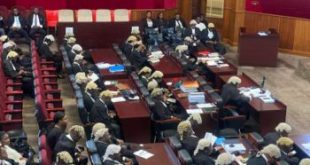The National Assembly has passed significant legislation aimed at strengthening Nigeria’s fight against drug trafficking and improving governance at the federal, state, and local government levels.
In a major development, the lawmakers amended the National Drug Law Enforcement Agency (NDLEA) Act to introduce life imprisonment for those found guilty of engaging in drug trafficking and related offences.
The amendment was approved after both the Senate and the House of Representatives adopted the harmonised report on the NDLEA Act.
Presenting the report, Senator Tahir Monguno, Chairman of the Senate Conference Committee, explained that the new law was designed to enforce harsher penalties to curb the growing drug trade and its associated crimes.
Under the amended Act, anyone found unlawfully involved in the storage, movement, or concealment of dangerous drugs or controlled substances, especially if armed or disguised, will face a life sentence upon conviction.
Senator Monguno said, “This amendment seeks to strengthen the law by imposing tougher penalties on drug offenders to act as a deterrent and protect Nigerians from the devastating effects of illegal drugs.”
The amendment was approved in the Senate on Thursday during a plenary session presided over by Deputy Senate President, Barau Jibrin, and passed by a voice vote.
In addition to the NDLEA Act amendment, the Senate also passed the Revenue Mobilisation, Allocation, and Fiscal Commission (RMAFC) Bill, 2024, which is set to overhaul the existing RMAFC Act of 2004.
The new bill proposes to revise the composition and operational framework of the commission, ensuring that Nigeria’s three tiers of government receive their rightful share of resources to tackle developmental challenges.
Senator Yahaya Abdullahi, Chairman of the Senate Committee on National Planning and Economic Affairs, who presented the bill, highlighted the urgency of reforming the RMAFC in light of the country’s financial challenges and growing population. He explained that the current Act, last revised over 20 years ago, no longer reflects Nigeria’s evolving economic realities.
“The RMAFC Bill seeks to provide additional funding and a more effective operational framework for the commission.
This is crucial for the proper allocation of resources among the federal, state, and local governments, especially given the challenges we face in revenue generation,” Senator Abdullahi said.
The bill addresses the need for better funding to enable the RMAFC to perform its constitutional duties, especially as inadequate resources have historically hindered its effectiveness.
After thorough deliberations, the Senate passed the bill, and it now awaits President Bola Tinubu’s assent to become law.
 National Telescope national telescope newspaper
National Telescope national telescope newspaper



